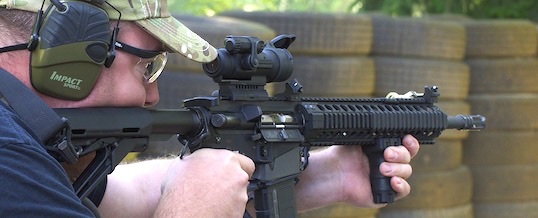
Want to improve your skill development? Take notes during class. Lots of ’em.
A couple of years ago I was teaching a class in which there was an interesting mix of students: there were two public-sector firearms instructors, one from a state agency and one from a federal agency, along with the normal range of people you’d find at any shooting course anywhere in the country — blue collar, white collar, redneck and professional. All of them were motivated enough to sign up for class and pay good money for the dubious privilege of listening to me ramble for a couple of days.
What was interesting about this class was that, during every short or long break, there were two people furiously scribbling in notebooks. In fact they would often take their notebooks up to the shooting line with them, and whenever I stopped to give a short lecture they’d be scribbling away again.
Which two students? I’ll give you a hint: the two whose job it was to teach others. They understood the value of the material they were listening to and didn’t want any of it to get lost in their heads. Instead they were committing it to paper so that they could later review and reflect on what they’d experienced. They were serious about the topic.
I’ve said this before: I can tell who’s serious and who’s not by their level of dedication to recording the material. Serious students don’t leave their recall or understanding to chance!
Why should you take notes in your self defense classes? There are several reasons:
1) It helps you to grasp concepts. Most self defense classes are a combination of physical skills and underlying concepts. It’s easy to get lost in the physicality of a course and gloss over the concepts that are taught, and it’s often the concepts which are the most important. Making sure that you’ve recorded the conceptual information allows you to review it later when you’re not overwhelmed with the kinesthetic aspects.
2) It helps you remember nuances of physical skills. Let’s take a defensive shooting course as an example; it’s actually fairly common for students to take a few weeks off after a class and then, on their next trip to the range to practice those skills, forget important parts of what they were supposed to do. It doesn’t matter how many repetitions they get in a class, there just isn’t enough instructional time to really develop a non-cognitive skill. If you have to think about it — and at the early stages of skill development, you do — the possibility exists that you’ll forget something. Taking notes allows you to get down specifics and even insert reminders and memory “hooks” to help you practice the skill correctly later on.
3) It helps you synthesize the course into a cohesive whole. When skills and concepts are interrelated, as they usually are, sometimes it’s hard to understand exactly how things fit together. Information is given at a point where it makes sense, but it’s often dependent on something that comes later (or that which comes later is dependent on multiple things, some of which may not have been presented yet.) Taking notes gives you the ability to sit down and calmly look over all the information you learned and see how all the pieces fit together and reinforce each other. (Sometimes it even shows up important inconsistencies in the instructor’s material!) For me, this is the most important reason.
4) It helps you form a practice strategy. At the end of a course instructors will often get the question “how can I practice these skills on my own?” My favorite answer is “do the drills just like we did in class”, to which the student will give a blank stare. I’ve been known to followup with “bet you wish you’d taken notes now!” The best way to practice skills is the way your instructor had you practice them in class, but again there’s a lot of detail that you need to remember. In my classes, for instance, we’ll do many different drills to emphasize specific skills and concepts, all of which are laid out for the students at the time they’re being done. Those who take notes on that information have, in essence, a practice manual that they can take to the range to recreate the experience at any time they desire. For most of my students, this is the most important reason to take good notes.
If you’re taking a class to really learn, as opposed to simply engaging in a recreational activity, good notes facilitate a complete learning and skill development cycle.
A caution: taking the time to make good notes means that you’ll be busier than the people around you, which forces you to be more efficient in everything you do. I have seen courses where the instructors, anxious to stick to a timetable, discourage note taking in subtle or even overt ways. (Frankly, to me it’s a warning sign that the instructor might be assigning more value to the entertainment aspects than the learning.) If you encounter such a course, take notes during the lunch break and immediately after class — going so far as to be sitting at a range bench after everyone has left!
Make a resolution to benefit your defensive education: make a notebook and lots of writing utensils as much a part of your class gear as your gun and hearing protection!
– Grant Cunningham
Listen to this blog post!
- Posted by Grant Cunningham
- On June 17, 2016



